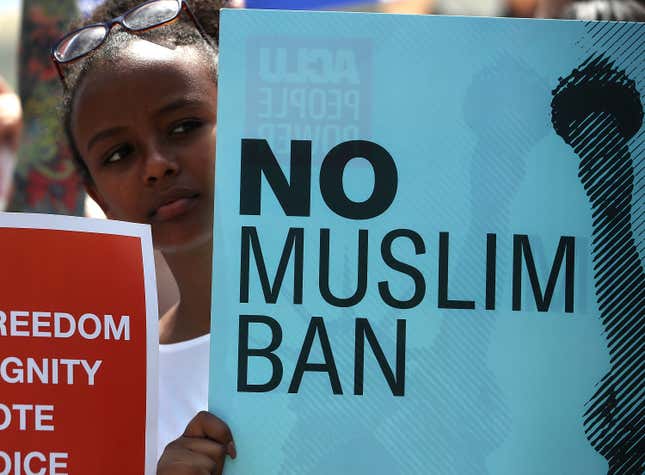
The Trump administration announced Friday that it is adding six new countries to the existing travel ban, joining the seven already on the list. Eritrea, Kyrgyzstan, Myanmar, Nigeria, Sudan, and Tanzania all made the new list of nations President Donald Trump is cutting off travel from, citing security risks.
According to Washington Post, people across the African continent, and especially in Nigeria, are not too happy with the new ban. Nigeria represents Africa’s most populous nation and biggest economy. Under the new measure, most Nigerian citizens, as well as those from Eritrea, would be blocked from coming to live and work in the United States. The ban also affects citizens from Tanzania and Sudan who would be barred from the competitive U.S. visa lottery.
In a statement issued on Friday which begins, “Defending American lives and safety is the President’s highest duty,” the White House claims the new policy to be “the height of common sense” and, while they don’t specify what security risks these specific countries have been proven to pose, the statement says the new rules apply to nations that “fail to conduct proper identity management protocols and procedures, or that fail to provide information necessary to comply with basic national security requirements—including sharing terrorist, criminal, or other identity information.”
The statement also says that the “new restrictions will not apply to tourist, business, or other nonimmigrant travel.”
After the announcement, Nigerian President Muhammadu Buhari launched a committee to “study & address” the changes, his office tweeted Saturday.
“Nigeria remains committed to maintaining productive relations with the United States and other international allies especially on matters of global security,” the president’s office said in a statement.
According to the Post, Democrats, who widely anticipated this move, had already blasted it as “clearly discriminatory” and that accusation is compounded by how vague U.S. officials have been about why, exactly, these countries have been banned. Being that Trump has seemingly always had a hard-on for banning Muslim-majority countries from U.S. travel, simply citing “concerns” just isn’t enough of an explanation.
An example of how this policy contradicts reality lies in officials’ insistence that Sudan is a state sponsor of terrorism despite the country’s widely praised transition last year from military rule to a civilian-led government.
As for Nigeria, the country’s citizens are probably the most harshly affected being that they accounted for one of the biggest groups of visa overstays in 2018, according to the Department of Homeland Security, and it currently has more than 300,000 immigrants residing in the United States.
Nigerian Sen. Mohammed Sani Musa, who represents part of central Niger state, said lawmakers would work to reverse the new policy.
“We are a giant of Africa—the biggest population of black people in the world,” Musa said, “so this is unfortunate. It’s harsh. And I hope it’s temporary.”
Atiku Abubakar, the country’s former vice president, also weighed in urging the United States to reconsider the scope of the policy.
“I call on President @realDonaldTrump to consider adopting measures that individually target those in government who have failed in their duties, rather than target the entire Nigerian population,” he tweeted Saturday.
Abubakar Sidiq Usman, a writer and new media specialist for the Nigerian Senate, said, “It sends the message that Nigerians cannot be trusted. Those going to the U.S. for business or leisure will face more scrutiny now.”
Matthew Page, an Africa analyst at Chatham House in London, spoke on how this move comes at a time when the U.S. is supposed to be trying to grow business and business relationships in Africa.
“Instead of deepening ties to Africa’s biggest economy, the administration appears to be going out of its way to sour its relationship with one of the continent’s most important nations.”
Finally, Osai Ojigho, director of Amnesty International’s Nigeria office, said in a statement that the ban “demonizes” the country’s people.
“It can only officialize discrimination,” she said, “and harm those fleeing conflicts, torture and those who simply want to unite with their families in the U.S..”
Trump’s original travel ban was instituted in 2017. That ban, which federal courts truck down but the U.S. Supreme court upheld, was widely criticized as xenophobic and Islamophobic and inspired nationwide protests. These new add-ons to the ban, which take effect on February 22, may very well be received the same way within the U.S. and abroad.

